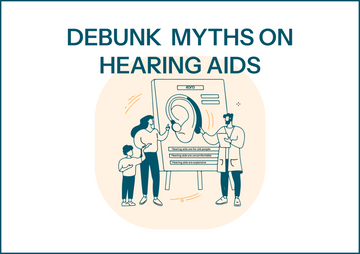When it comes to addressing hearing loss, many individuals seek audiologist recommendations and the latest in hearing aid technology. For those considering an OTC hearing aid or other hearing solutions, understanding the insurance landscape is crucial. Navigating insurance related to hearing aids can be daunting, but with the right information, you can make informed decisions about your health and finances. In this guide, we will breakdown everything you need to know about insurance coverage for hearing aids.
Understanding Hearing Aids
First, let's explore what hearing aids are and how they function. Hearing aids are small electronic devices designed to amplify sound for those experiencing hearing loss. They come in various styles and technologies, from in-the-ear devices to behind-the-ear models, and are tailored to meet the specific needs of users. An OTC hearing aid is available over the counter and does not require a medical exam, making them a convenient option for many.
The Importance of Hearing Health
Hearing health significantly impacts our quality of life. Untreated hearing loss can lead to communication barriers, difficulty in social situations, and even feelings of isolation. Moreover, there's a strong correlation between tinnitus—a ringing or buzzing in the ears—and hearing loss. Addressing these issues early with the help of an audiologist can ensure you maintain an engaged and active lifestyle.
Types of Insurance Coverage for Hearing Aids
When considering hearing aids, it’s important to know what type of insurance coverage you have. The three main types include:
- Private Insurance: Many private insurance plans offer partial or full coverage of hearing aids. Coverage levels can significantly vary from one plan to another.
- Medicare: Traditionally, Medicare does not cover hearing aids; however, it may cover diagnostic services for hearing loss and tinnitus evaluation.
- Medicaid: Medicaid provides coverage in many states for hearing aids, especially for qualifying low-income individuals. Specific benefits vary by state.
Evaluating Your Health Insurance Plan
Before making any decisions, it's essential to evaluate your health insurance plan. Here’s a checklist to assist you:
- Check if hearing aids are included in your policy.
- Examine the limitations or caps on coverage.
- Look for any co-pays or deductibles related to hearing services.
- Find out if there are preferred audiologists or clinics that offer discounted rates.
What to Expect from an Audiologist Consultation
When visiting an audiologist, expect a thorough hearing evaluation. This evaluation often includes:
- Conducting pure-tone audiometry tests to measure your hearing threshold.
- Testing for tinnitus and its impact on your auditory health.
- Discussing your lifestyle and preferences to recommend suitable hearing aids, including OTC hearing aids.
After the assessment, the audiologist will discuss potential treatment options, including whether insurance can support your hearing aid purchase.
The Role of Medicare and Medicaid in Hearing Aid Coverage
Many individuals inquire if Medicare covers hearing aids. As noted earlier, Medicare generally does not offer coverage for hearing aids, which can be disappointing for many seniors. However, it does cover diagnostic tests if ordered by a doctor, which can be crucial for identifying the degree of hearing loss. For those eligible for Medicaid, it's a different story, as many states have varying benefits for hearing aid coverage. Thus, it’s essential to check with your local Medicaid office for specific policies regarding hearing aids.
How to Make the Most of Your Insurance Coverage
Here are some strategies to maximize your benefits when purchasing hearing aids:
- Take advantage of annual exams: Regular check-ups may lead to easier approvals for hearing aids.
- Keep records of all audiologist visits and treatments.
- Ask your audiologist about any programs or partnerships they may have with your insurance provider.
- Be proactive in contacting your insurer to understand your coverage limits.
Understanding the Costs Involved
The costs associated with hearing aids can be substantial. Depending on features and technology, hearing aids can range from a few hundred to several thousand dollars. Here’s a breakdown of potential out-of-pocket expenses:
- Initial Consultation: Some insurance policies cover the consultation fee, but many do not.
- Hearing Aids: Check which models your insurance plans cover; there might be a restriction on the types of hearing aids you can choose.
- Follow-Up Visits: These may be charged separately, impacting your total expenses.
- Maintenance and Replacement: Keep in mind that hearing aids require regular maintenance, which might not be covered by insurance.
Exploring OTC Hearing Aids
In recent years, the landscape for hearing aids changed dramatically with the introduction of OTC hearing aids. These devices are designed to be purchased without a prescription, making them more accessible for many consumers. However, it’s essential to understand the implications concerning insurance:
- Insurance typically does not cover OTC hearing aids as they are designed for consumers who may not require professional evaluation.
- OTC devices are often less expensive, but it’s crucial to conduct your research and read customer reviews.
- Look for audiological support even when using OTC options to ensure you select the correct device for your needs.
The Future of Hearing Health Insurance Coverage
As awareness grows around the impacts of hearing loss and the importance of early intervention, changes in legislation and insurance coverage policies are becoming more common. Various advocacy groups are pushing for comprehensive coverage for hearing aids, especially for seniors and those with tinnitus.
Additional Resources for Hearing Aid Users
For those navigating the journey of hearing loss, various resources can assist you:
- The Hearing Loss Association of America (HLAA): A comprehensive organization providing support and resources for individuals with hearing loss.
- State Health Departments: Research local programs that offer hearing aids or financial assistance based on income.
- Online Communities: Joining forums and groups can provide emotional support and firsthand accounts from others facing similar challenges.
Why You Should Act Now
Understanding and utilizing insurance coverage for hearing aids is vital in managing your hearing health. Don’t wait until hearing loss worsens. Schedule a consultation with an audiologist today to take charge of your hearing. The sooner you address the symptoms, including tinnitus, the better your chances of effective management. Whether through insurance or accessible options like OTC hearing aids, you can reclaim the sounds of life and enhance your overall well-being.

























